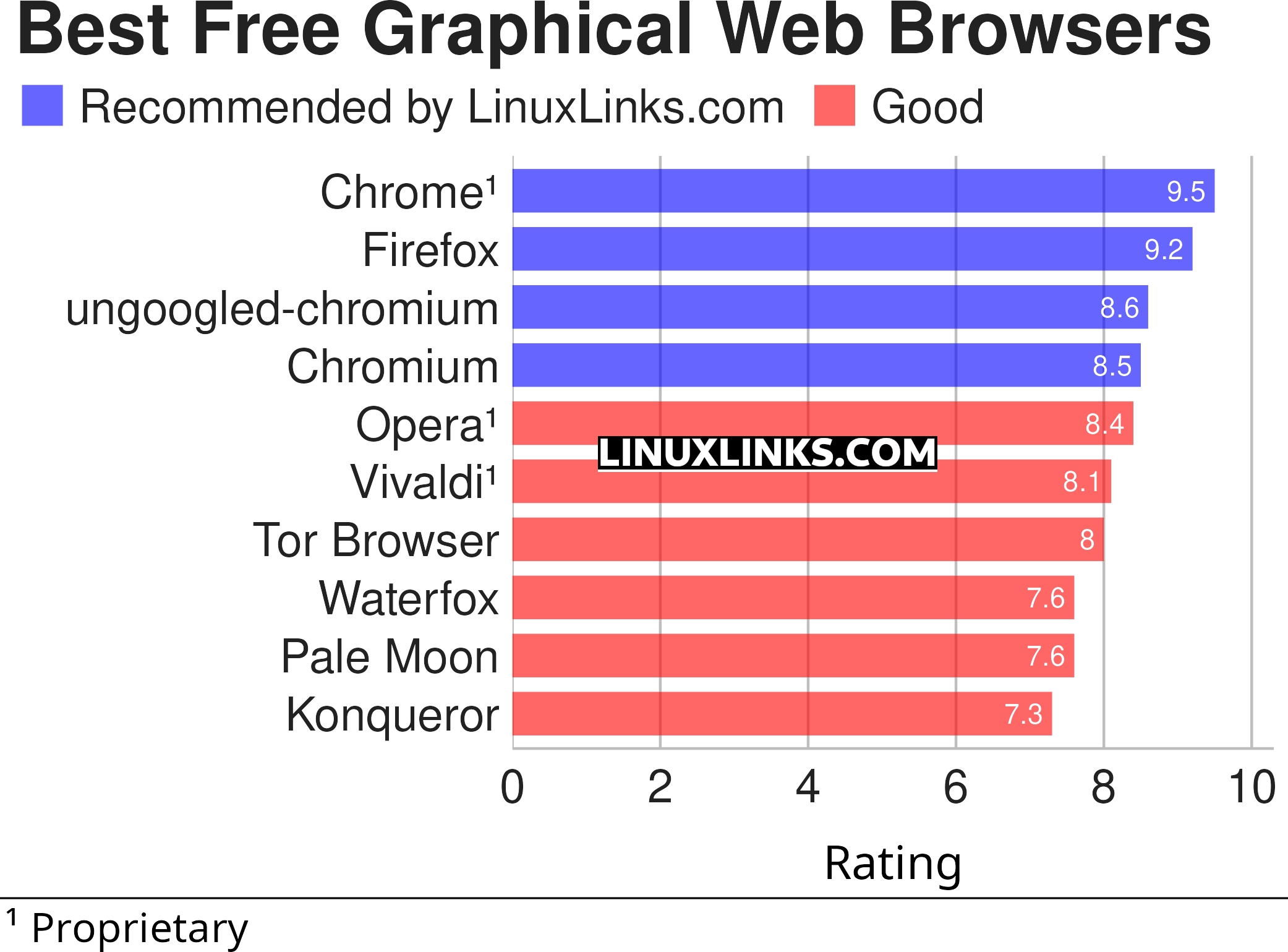A web browser is the quintessential desktop application. Everyone needs one, and there is not a desktop Linux distribution around that does not make a web browser available.
This type of software application is responsible for retrieving and presenting information held on the World Wide Web, a system of interlinked hypertext documents accessed via the internet. Web browsers allow users to view web pages which often contain a mixture of text, images, videos, and other multimedia.
There are many different web browsers available for Linux, the most popular of which are Google Chrome and Firefox. However, the market dominance of Google Chrome and Firefox does not mean that they are necessarily the best web browser for every situation.
Everyone has their own needs, some preferring heavyweight browsers packed with a large number of features and add-ons, other users still wanting an attractive graphical browser but with a smaller footprint. Many graphical browsers consume large amounts of memory. Some users find this not acceptable, especially if they are using a machine with low specifications. We’ll cover lightweight web browsers (including console based web browsers) separately.
While we recognize that Google Chrome, Opera and Vivaldi are closed source proprietary software (free to download), they are nevertheless worthy of inclusion in this article.
To provide an insight into the quality of software that is available, we have compiled a list of 10 excellent graphical web browsers. Here’s our verdict captured in a legendary LinuxLinks-style ratings chart.

Click the links in the table below to learn more about each web browser.
| Web Browsers | |
|---|---|
| Google Chrome | Secure web browser with minimalistic user interface |
| Firefox | Highly popular browser delivering safe, easy web browsing |
| ungoogled-chromium | Chromium without Google web services |
| Chromium | Open-source project behind Google Chrome |
| Opera | Popular graphical web browser and Internet suite |
| Vivaldi | Designed for staunch technologists and former Opera browser users |
| Tor Browser | Protect against tracking, surveillance, and censorship |
| Waterfox | Fast and privacy conscious web browser powered by Gecko, |
| Pale Moon | Goanna-based web browser |
| Konqueror | KDE's advanced file manager, web browser and document viewer |
This article has been revamped in line with our recent announcement.
 Read our complete collection of recommended free and open source software. Our curated compilation covers all categories of software. Read our complete collection of recommended free and open source software. Our curated compilation covers all categories of software. Spotted a useful open source Linux program not covered on our site? Please let us know by completing this form. The software collection forms part of our series of informative articles for Linux enthusiasts. There are hundreds of in-depth reviews, open source alternatives to proprietary software from large corporations like Google, Microsoft, Apple, Adobe, IBM, Cisco, Oracle, and Autodesk. There are also fun things to try, hardware, free programming books and tutorials, and much more. |

We have considered all available graphical web browsers when completing this survey. Only the finest web browsers are included.
Historic comments are retained for completeness.
Funny thing about Open Source: it’s not always ethical. Chromium, for example, while listed as Open Source actually calls the mother ship.
It’s only with great effort that companies and individuals using the source code are able to clean it. As far as I’m concerned, it’s unethical, dirty code.
I’d much rather use Vivaldi than Chromium. In the end, I opted for Firefox which handles the modern web with little effort and focuses on protecting their users from the abuses of Big Tech.
Mozilla has made some questionable decisions that have led to trust issues but they also give you the tools (including about:config) to remake the browser in your own image.
Curious logic, Vivaldi calls home too.
And I’m going with… qutebrowser.
I’m a total Firefox guy, also love Tor and… W3M… Vivaldi is cool too, but I wonder who still use Konqueror O_O
Konqueror works out of the box for watching TV with Ziggo (The Netherlands), where Firefox needs to install additional DRM module.
But that’s the only thing I use it for.
oh, now I see why I don’t use Konqueror lol. for watching TV I straightly go to VLC……
Generally I use Firefox, although I use Web/Epiphany as an interface to connect internet.
I would also be inclined to use Epiphany for SSBs (site specific browsers), although I am still exploring other clean and uncluttered minimalist browsers, that have better built-in plugins.
PS: This a great website.
Has anyone done a review on quality of original content they find and show? Most all browsers on this list only show the same results and ignore / block some websites. They only go out 10 pages, They show repeat results and they don’t allow you to see the entirety of the internet. Its like watching the news, they only let you see what they want to let you see.
It sounds you are confusing search engines with web browsers?
Exactly, a web browser doesn’t block websites from search results.
Alan, maybe a partial answer to your problems would be to switch to another DNS server in the options of your browser. I know I had to in firefox to be able to get access to some torrent websites for me to download… ahem… linux distributions.
I’m using ungoogled-chromium, it works really well and doesn’t leak my data.